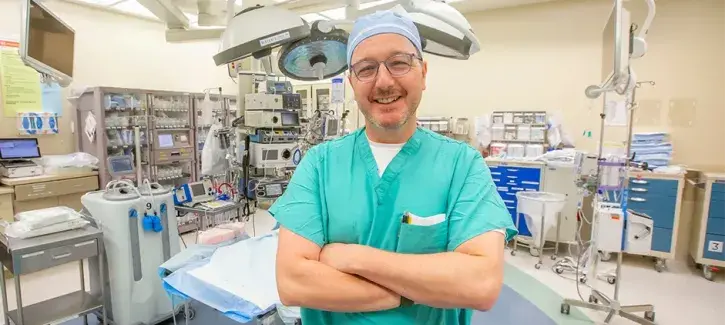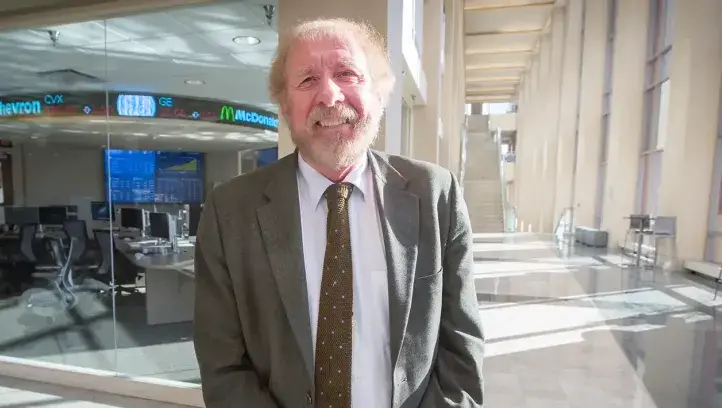
Healing people and Earth: Anesthesiology innovates for a healthier future

This Earth Month, we celebrate the Creighton University community’s commitment to building a healthier, more sustainable planet. As we continue to uncover new ways to reduce our environmental impact, it becomes increasingly clear: sustainable options are everywhere—you just have to look for them.
Mark Reisbig, MD, PhD, chair of the Department of Anesthesiology at Creighton and CHI Health, exemplifies this mindset. A relentless problem-solver and innovator, he’s driven by a single goal: to make healthcare process better.
Also holding an MBA, Reisbig is a systems thinker; he sees gaps others may overlook, and most importantly, acts on it. “Our department has a number of different research and process improvement projects currently taking place that involve our medical students,” says Reisbig.
Within the Department of Anesthesiology & Perioperative Medicine, Reisbig leads efforts to standardize care and improve outcomes. He has focused much of his efforts on decreasing opioid exposure without compromising patient comfort. “Currently, one of the goals for our department is to develop a research program that benefits both the medical school, our department, our community and CHI Health/CommonSpirit Health,” Creighton’s clinical partner.
Although it’s the focus of their work, Reisbig and his team don’t only study patient care—they’re looking into caring for Earth, researching how they can decrease carbon dioxide (CO2) emissions from operating rooms.
“10-30% of hospital emissions are generated in the operating room,” says Reisbig, adding that anesthesia gases constitute a large percentage of these emissions. “Volatile anesthetics and nitrous oxide emissions have a negative impact on the environment.”
Reisbig is exploring techniques to more efficiently utilize anesthetic gases without compromising patient care. In one project, Reisbig collaborated with Saad Khan, MD, Cassie Hayes, PhD, and Matthew Lam, MD, to examine the environmental impact attributed to desflurane, a volatile anesthetic. “This study was initiated because Drs. Khan and Lam were looking for ways we could help reduce some of the greenhouse gas emissions coming from the operating room,” says Reisbig. Concurrently, CommonSpirit Health removed desflurane from the formulary, or the list of drugs allowed to be used at a medical facility.
When we calculated emissions and cost before and after the formulary change, says Reisbig, “we realized firsthand what taking desflurane out of a busy operating room did for the environment. It was a substantial decrease in our emissions.”
The effort to remove desflurane, left sevoflurane, a volatile aesthetic with similar clinical properties, as the main anesthetic gas used in the operating rooms. Sevoflurane is less expensive and has less of an impact on the environment. “Transitioning to exclusive use of sevoflurane reduced emissions by 57.6 mtCO2, the equivalent of 147,692 car miles,” says Reisbig. “The analysis of this change demonstrated the downstream environmental and economic benefits.”
But removing desflurane alone isn’t a perfect solution. The next phase of the work involves reducing sevoflurane usage by employing low-flow anesthesia. With this approach, less gas is utilized to get the same effect resulting in even fewer emissions each year—to the tune of 113 mtCO2 emissions, or 298,000 car miles.
“It’s better for the environment. It’s better for the hospitals. It does not change the quality of the care our patients receive,” says Reisbig. “It’s our responsibility to do everything we can safely do, to be stewards of the environment. This also has the benefit of decreasing the overall costs to the healthcare system, and ultimately for the patient.”
Reisbig is currently working on an effort aiming to decentralize the nitrous oxide supply in hospital systems. “Right now, we have a central supply in the hospital, and it reaches our anesthetizing locations through pipes in the walls. Anywhere between 70–95% of that gas leaks out through the pipes and into the atmosphere. It never reaches the patient,” says Reisbig. He’s partnered with CommonSpirit Health facilities director, Dylan Cardiff, working to switch to more efficient localized tanks. Reisbig’s team expects to cut both costs and emissions once again.
Reisbig knows well that environmental health and human health are intertwined. “We all have to do our part in being responsible stewards of our resources. Keeping a healthy planet allows us to continue to keep our populations healthy,” he concludes.
As Creighton continues to integrate sustainability across disciplines and departments, Reisbig’s work offers a powerful reminder of what’s possible when healthcare and environmental care go hand in hand.




